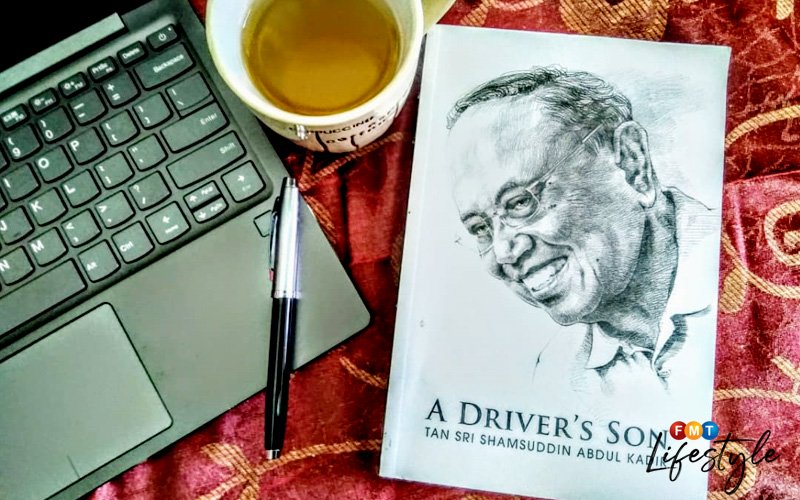
A Driver's Son:
How a kampung boy founded a telco giant

March 20, 2020
By Noel Wong
PETALING JAYA: Isn't it fascinating how the mightiest of trees grow from the smallest of saplings?
With the right amount of soil, nutrients, water and a bit of luck, what initially measured up to your ankle can grow thrice your height and many times your size.
Equally inspiring is the story of Shamsuddin Abdul Kadir, founder of Sapura Holdings, who as the son of a humble chauffeur, came to achieve great entrepreneurial success later in life.
His book, A Driver's Son, paints a vivid picture of life in a "kampung", his close-knit family, the many hardships he endured as a young man, as well as his colourful business experiences until the setting-up of Sapura.
He also recounts his numerous acquaintances, many of whom later rose to become notable figures in local and international politics and business.
As the title of the book indicates, Shamsuddin had humble roots. Born at exactly 4 a.m. on Aug 19, 1931, to a chauffeur and his housewife, Shamsuddin would remain their only child.
While the family moved around a lot due to work demands, his father recognised the importance of a wholesome education for his son.
Shamsuddin writes of the time when as a student of the Gombak Lane Malay School in Kuala Lumpur, he was caught playing truant by his mother.
He remembers well the look of utter dismay and disappointment on his mother's face and writes, "It filled me with regret and shame and the only way I knew how to make amends was to study hard and push myself."
And that he did, with a string of academic successes to show for it.
In spite of his family's financial status, Shamsuddin secured a place at the Brighton Technical College, and later armed with an engineering degree, gained invaluable experience serving in Telecoms.
It was also here that he met the love of his life and future wife, Sapura.
Shamsuddin's relationship with his late wife is a sweet and touching love story. He writes that through all the hardship, she remained his pillar of strength.
Even when they experienced a personal loss that almost crippled them, the couple stayed devoted to each other, making their marriage one "built on love and patience." So strong was Shamsuddin's love for his wife, that he named the now famous company he founded after her.
Shamsuddin's story is a must-read for anyone seeking to be inspired by one of Malaysia's most successful Malay entrepreneurs.
In his frank manner, Shamsuddin makes no secret that getting to where he is now was no easy task and required much sacrifice and commitment.
Throughout the book, anecdotes from famous public figures who befriended Shamsuddin at some point in his life, are included. They offer interesting insights into Shamsuddin's character and how he left a lasting impression on them.
Including former prime minister Dr Mahathir Mohamad, who in the foreword he wrote for A Driver's Son, heaps praise on Shamsuddin for his stalwart character.
Besides serving as an autobiography, the book provides a historical account of the Malaysia of yesteryear, when things were simpler in some ways and tougher in others but idyllic nonetheless.
His description of Kuala Lumpur as a quiet town is surreal when compared to the bustling metropolis that now stands in its place.
Rather admirably, Shamsuddin firmly asserts that his and Sapura Holdings' success was based on staying true to his principles.
The final chapter in particular offers great pointers to business people wishing to set-up their own enterprises.
He extols the values of meritocracy rather than cronyism in ensuring that a company retains its integrity. "Use your 'know-how' and not your 'know-who' to get the jobs."
The importance of understanding one's current situation is also emphasised, "Make sure that you know what you want to do.... Even if you manage to land some work, you may find yourself clueless about how to actually do it."
His last point is his most poignant, coming as it is against the backdrop of rampart corruption, as witnessed not only in Malaysia but all over the business world.
Rather than brushing bribery aside as a "necessary evil" when doing business, Shamsuddin says, "You always have the choice - to pay or not to pay - but keep in mind that once you start giving the money, you will likely always have to give it."
He also says that change is in the hands of business people themselves when he writes, "Perhaps if more people were prepared to take the risk of not paying, then things could start to change."
Such inspiring words, interspersed with humorous and tragic slice-of-life stories, are what make A Driver's Son worthy of a spot on one's bookshelf.
 The V.I. Web Page
The V.I. Web Page